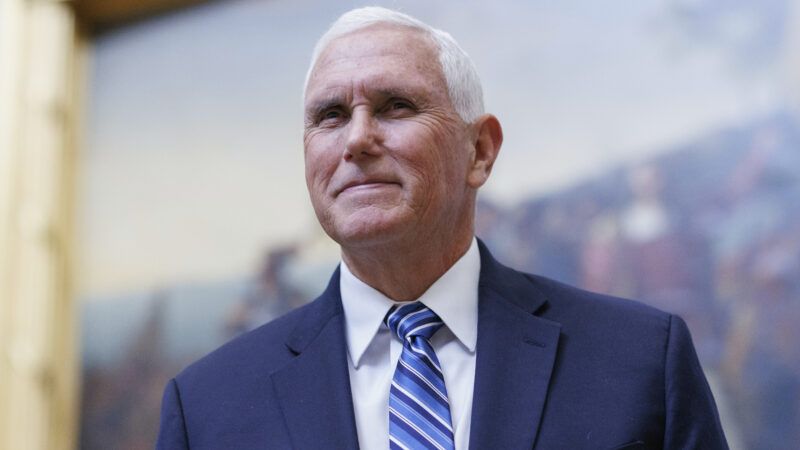Mike Pence's Sensible (and Probably Doomed) Plan To Fix the National Debt
Lawmakers must be willing to reform so-called "mandatory spending," Pence's nonprofit argues in a new document.

Former Vice President Mike Pence is leading a new effort to convince federal lawmakers to address the spiraling national debt.
The debt surpassed the $35 trillion threshold in late July, less than eight months after hitting the $34 trillion mark. The upward trend won't stop anytime soon: the Congressional Budget Office expects the debt to hit $56 trillion by 2034, at which point the debt will be 122 percent the size of the U.S. economy.
With the country veering into uncharted and dangerous territory, Pence's newly launched nonprofit, Advancing American Freedom (AAF), is asking lawmakers to steer back towards calmer fiscal waters.
"After decades of ignoring the significance of profligate federal spending, the consequences are finally starting to catch up to us," argues the nonprofit in an eight-page document that outlines some basic strategies for getting the debt under control. "America faces a bleak future as interest payments crowd out spending on basic government functions, our economy stagnates under the drag of an unsustainable burden, and we're put at a strategic disadvantage internationally."
To get the debt under control, AAF points out that lawmakers cannot simply focus on the discretionary part of the federal budget—which accounts for less than 30 percent of all federal spending. Meanwhile, so-called "mandatory spending" accounts for more than 60 percent (the rest is interest payments on the debt).
Most of the mandatory spending category is made up of Social Security and Medicare, but several other programs also run on autopilot, including food stamps, federal worker retirement benefits, Obamacare's health insurance subsidies, and veterans' benefits.
"Mandatory spending is the biggest driver of the national debt because there is no restriction on the unchecked growth of these programs," argues AAF's debt report.
Among the proposals to bring mandatory spending under control, the group argues for means-testing future Social Security cost-of-living adjustments (COLAs) for individuals making more than $1 million annually, stopping President Joe Biden's student loan cancellation plans, ending Obamacare's insurance subsidies for wealthy Americans, and the formation of a congressional commission to propose spending cuts.
The group also calls for ending so-called "tax expenditures," which are forms of spending hidden in the tax code—for example, corporate green energy subsidies delivered in the form of renewable tax credits.
The new document picks up where Pence left off in his failed Republican primary campaign last year. On the campaign trail, Pence talked up the importance of sane fiscal policy and condemned his former boss—Republican presidential nominee Donald Trump—for ignoring the threat posed by runaway borrowing and unsustainable entitlement programs.
Of course, Pence's campaign never got off the ground in any meaningful sense. Former South Carolina Gov. Nikki Haley had a little more success, but there's clearly not much of a constituency for serious talk about the debt.
Still, it's important to try. In an essay published by Reason last year, Pence urged conservatives to "resist the temptation to put what is popular over what is wise." In that case, he was criticizing the ongoing trend of prominent Republicans abandoning free market principles and embracing will-to-power politics as a solution to America's problems. But he might as well have been talking about debt, too. Much of that $35 trillion borrowing has occurred because leaders prioritized what is popular (government spending) over what is wise (spending only as much as you're willing to raise in taxes).
Pence is not totally blameless in this, of course. He seems to have had little influence in the Trump administration. Nonetheless, he was a major figure in a presidential administration that added more than $8 trillion to the debt in just four years—a record that Biden is now working hard to equal. As a member of the House of Representatives for a dozen years starting in 2001, Pence arrived in Washington when the federal budget was nearly balanced. He supported two costly foreign wars (though he opposed an expensive expansion of Medicare during the George W. Bush administration).
It's tempting to dismiss all this as meaningless—after all, Pence is a pariah within his own party and likely has even less influence with Democrats. He holds no elected office, and there's no reason to believe that will change anytime soon.
But none of the people who have political power seem willing to engage with the question of what to do about the national debt—at least not in public or on the record. Pence has nothing to lose, and that means he's free to say the things that others won't. I hope he keeps talking.


Show Comments (106)